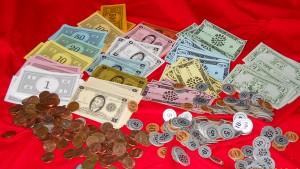Time to head for the game closet and dig out some play money! This stuff is a fabulous tactile learning tool that can be used for much more than just collecting $200 for passing “GO.” Use play money to practice counting by 1’s or skip-counting (by 5’s, 10’s, 100’s, etc.)with the littles, demonstrate place value and the substitution needed for arithmetic with the middles (borrowing, carrying, trading, regrouping, swapping, bundling, or whatever you choose to call it in your lessons), practice making change, or discuss money management with the olders. You can get more creative and challenge your students to grab a handful of play money and calculate the amount, then write out the amount in both digits and words. Some of you may take up the challenge to grab several random amounts and use those for addition, subtraction, multiplication, or division problems. Here’s another challenge: let your students make up their own story problems for random amounts of play money—they’ll be getting math practice and writing practice at the same time.
If you have several games that contain play money, pull it all out and pool it together: sorting by denomination is good math practice. As seen in the picture, not all games use the same denominations, so your students can learn to adapt their math practice to the supplies that are available. I even threw in a large handful of real pennies from the coin can that serves as a doorstop here—if you have a coin can or jar, you might want to borrow some of its contents for a little more math practice. (My kids paid much closer attention to math discussions if the problems involved money or food instead of just meaningless numbers!) When the math lesson is over, let the kiddies continue sorting and counting the play money: setting up a pretend “store” is great “stealth” learning! Maybe they’d like to invent a new game that uses all this play money, plus several other random pieces from a few games. Setting up the game instructions offers writing practice, determining the rules is problem-solving practice, and playing the game will give even more practice in counting, adding, subtracting, making change, and whatever other math skills their new game includes. When the time comes, sorting all those game bits and play money back into their respective games is excellent experience for the sorting required in algebra and other higher math studies, and it gets the kids involved in putting things away, instead of leaving all the clean-up to Mom.
For more tips, see also:
Building Blocks for Success in Math
Sorting Toys Is Algebra
Gee Whiz! Quiz



 Guilt-Free Homeschooling is the creation of Carolyn Morrison and her daughter, Jennifer Leonhard. After serious disappointments with public school, Carolyn spent the next 11 years homeschooling her two children, from elementary to high school graduation and college admission. Refusing to force new homeschooling families to re-invent the wheel, Carolyn and Jennifer now share their encouragement, support, tips, and tricks, filling their blog with "all the answers we were looking for as a new-to-homeschooling family" and making this website a valuable resource for parents, not just a daily journal. Guilt-Free Homeschooling -- Equipping Parents for Homeschooling Success!
Guilt-Free Homeschooling is the creation of Carolyn Morrison and her daughter, Jennifer Leonhard. After serious disappointments with public school, Carolyn spent the next 11 years homeschooling her two children, from elementary to high school graduation and college admission. Refusing to force new homeschooling families to re-invent the wheel, Carolyn and Jennifer now share their encouragement, support, tips, and tricks, filling their blog with "all the answers we were looking for as a new-to-homeschooling family" and making this website a valuable resource for parents, not just a daily journal. Guilt-Free Homeschooling -- Equipping Parents for Homeschooling Success!

Speak Your Mind